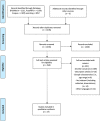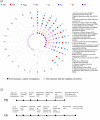Anaclitic-sociotropic and introjective-autonomic personality dimensions and depressive symptoms: a systematic review
- PMID: 34915926
- PMCID: PMC8680331
- DOI: 10.1186/s12991-021-00373-z
Anaclitic-sociotropic and introjective-autonomic personality dimensions and depressive symptoms: a systematic review
Abstract
Sociotropy (anaclitic) and autonomy (introjective) are conceptualised as two personality dimensions that confer vulnerability to depression. According to Blatt and Beck's theories, sociotropic individuals exhibit distinctive patterns of symptoms such as prominent anxiety, depressed mood, helplessness, crying and somatic concerns, while self-critical ones seem to exhibit a pattern of symptoms including prominent guilt, hopelessness, feelings of failure and worthlessness and other cognitive symptoms.This systematic review was performed with the aim of investigating whether and to what extent psychological dimensions of anaclitic-sociotropic and introjective-autonomy are related to a specific core of depressive symptoms. The search was conducted in three databases (PubMed, PsycINFO and Scopus) and 27 articles were selected.Results showed a weak association between somatic symptoms and dependent personality traits, while the relationship between self-criticism and cognitive symptomatology was significantly higher. These findings are discussed in the context of future research, necessary to corroborate the existence of a form of depression characterised by somatic features usually ignored by diagnostic criteria, essential to direct psychological treatments to these depressive personality differences.
Keywords: Autonomic personality; Complicated grief; Depression; Depressive symptoms; Psychological dimensions; Sociotropic personality.
© 2021. The Author(s).
Conflict of interest statement
The authors declare that they have no competing interests.
Figures


References
-
- Abi-Habib R, Luyten P. The role of dependency and self-criticism in the relationship between anger and depression. Personality Individ Differ. 2013;55(8):921–925.
-
- American Psychiatric Association. Diagnostic and statistical manual of mental disorders (DSM-5). American Psychiatric Pub. 2013.
-
- Arrindell WA, Ettema JHM. Klachtenlijst (SCL-90) [Dutch version of the Symptom Checklist-90]. 1986.
-
- Bar M, Schrieber G, Gueron-Sela N, Shahar G, Tikotzky L. Role of self-criticism, anxiety, and depressive symptoms in young adults’ insomnia. Int J Cogn Ther. 2020;13(1):15–29.
-
- Bastien CH, Vallières A, Morin CM. Validation of the insomnia severity index as an outcome measure for insomnia research. Sleep Med. 2001;2(4):297–307. - PubMed
Publication types
LinkOut - more resources
Full Text Sources

